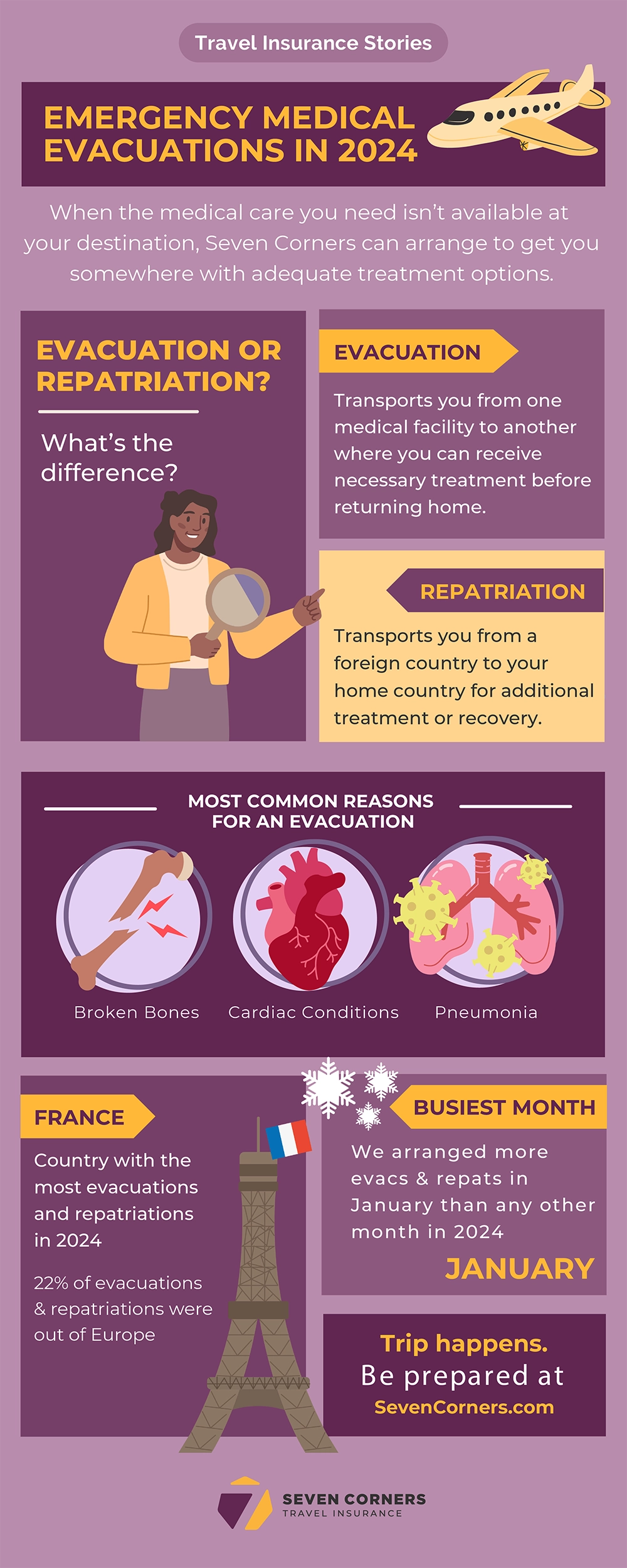You fall during a tour in China and break your leg. You get malaria while volunteering in Africa. You have bad luck and get kidney stones on your honeymoon in Southeast Asia.
It’s not fun to think about medical emergencies while traveling, and unfortunately, each of the scenarios above are true stories about Seven Corners customers. Fortunately, each of those customers was able to rely on Seven Corners for their care and emergency medical evacuation.
What Is Emergency Medical Evacuation and Repatriation?
Seven Corners travel medical plans provide coverage if you become sick or hurt while traveling. This includes emergency medical evacuation and repatriation benefits. If appropriate medical care is not available in your location, Seven Corners will pay to transport you to an area with the care you need.
Seven Corners will also arrange the evacuation or repatriation for you. The benefit and travel assistance, working together, can save you money — an evacuation could cost you $500 to $200,000 or even more if you were paying for it out of pocket — and reduce the anxiety of arranging care and transportation yourself in another country while trying to recover.
What’s the difference between emergency medical evacuations and repatriations?
With an emergency medical evacuation, you’re transported from one facility to another where you’ll have access to necessary treatment. The second facility with appropriate care may be in the same or another country.
For example, when Seven Corners customer, Matthew, was in a motorcycle accident in Laos, we evacuated him to Thailand where he could receive the medical care he needed. Felipe was also evacuated to Thailand — covering more than 600 miles via air ambulance — when he became extremely ill with gastroenteritis in Myanmar.
With repatriation, you’re transported from a foreign country to your home country where you can receive additional treatment or recover.
This is what happened when Darryl shattered his leg in China. After receiving the surgery he needed in Beijing, Seven Corners arranged transportation and a nurse escort to get him back to the United States.
Where Do Emergency Medical Evacuations Happen?
Seven Corners helps travelers all over the world find the medical care they need. Sometimes, that means we evacuate people from less populated areas that don’t have an extensive healthcare system. You might be surprised, though, how many evacuations and repatriations start in highly populated areas you’d normally expect to have high levels of medical care.
In 2024, nearly a quarter of evacuations and repatriations were out of Europe, and we arranged more evacuations and repatriations from France than any other country.
That’s somewhat unusual. In 2022, we evacuated more people from Thailand than any other country, and Southeast Asia is traditionally a region with many evacuations.
What Is the Longest Evacuation?
The evacuation that covered the most distance in 2024 started in Indonesia, more than 9,400 miles from the Seven Corners headquarters in Indiana.
Indonesia often earns this distinction, as it was also the lengthiest evacuation we arranged in 2022.
True story: Indonesian evac
In 2022, a customer was traveling with a friend in a remote region of Indonesia when she was struck by a car and broke her leg. The local hospital gave her a wooden splint, and she was discharged back to her hotel.
The customer quickly lost feeling in her leg. That’s when she contacted Seven Corners for help getting to an adequate facility on the mainland.
Due to the severity of her injury, she required immediate treatment. We arranged for a doctor to treat her in her hotel room while a helicopter transfer was being arranged. The doctor provided IV medication, prepped her leg for transfer, and ensured her vitals were stable. The customer was then airlifted to a hospital with an orthopedic surgeon where she underwent immediate surgery.
Seven Corners provided a guarantee of payment, essentially a promise from the insurer to the medical facility that it will receive payment for providing care. In some countries, it’s necessary to provide either a guarantee from the insurance company or upfront payment from the patient in order to receive treatment. Having travel insurance that can provide a guarantee of payment goes a long way toward reducing your stress. Who wants to worry about money in the middle of a medical emergency abroad?
In the end, Seven Corners arranged for the customer’s repatriation home once she was stable enough to fly, giving this traveler a happier ending than she might have otherwise had.
How Often Is Emergency Medical Evacuation Insurance Used?
Seven Corners has arranged hundreds of evacuations and repatriations in the last few years. These have saved travelers hundreds of thousands of dollars, not to mention provided priceless protection for their health.
While evacuations aren’t super common — and the 2024 count fortunately decreased 29% from the previous year — coverage remains hugely important. They can be very expensive and cause extreme stress, but travel insurance can ease those burdens.
What Are the Most Common Reasons for Medical Evacuations?
We assist with emergency medical evacuations if it’s determined that your destination is unable to provide medically necessary treatment. In 2024, the most common reasons for evacuations were broken bones, cardiac conditions, and pneumonia.
Interestingly, this has changed over the years. The most common reasons for evacuations in 2022, for example, were broken bones, COVID-related illness, and appendicitis. In 2017, it was altitude sickness, dengue fever, and (again) broken bones.
True story: Heart attack in Belize
It’s been some time now since Paul was evacuated from Belize, but his story offers an important lesson that bears repeating.
Paul suffered a heart attack while he and his wife, Lizbeth, were vacationing in Belize. He was fortunately able to reach Belize City, 90 minutes away from their eco-resort, where he’d have access to better medical care. Still, they knew he’d need more than the facility could provide.
Seven Corners worked with the hospital in Belize and Paul’s cardiologist in Baltimore, Maryland, to determine the best course of action. Ultimately, it meant bringing Paul back to the U.S. for treatment.
What could have been a devastating situation, both financially and for Paul’s wellbeing, turned out to be a happy ending. “I paid $90 for the insurance for both of us,” said Lizbeth, “and I think this is the biggest return on investment I’ll ever get in my entire life.”
What Assistance Services Does Seven Corners Provide?
Emergency medical evacuations and repatriations are arranged by the Seven Corners Assist team as part of our 24/7 emergency travel assistance services. All customers, regardless of the plan they purchase, have access to assistance services.
Medical assistance includes services such as medical bill payment guarantees, help locating medical care, medical record translations, and medical escorts in addition to emergency medical evacuation and medical repatriation.
Another type of assistance includes arranging for family to join you while you receive treatment. Leanne took full advantage of this when her daughter Makenzie was hospitalized in France while traveling solo.
Travel assistance services include political and natural disaster evacuations (when applicable for your plan), embassy contact information, inoculation and visa information, interpreter referrals, and more.
If you need medical assistance during your trip, you can contact Seven Corners Assist by phone, text, or WhatsApp.
- Toll free: 1-800-335-0611
- Worldwide: 1-317-575-2652
- Collect: 1-317-818-2809
- Text: +1-888-655-1402*
- WhatsApp: +1-555-814-1067*
*By sending a text to this number, you are opting in to receive messages from Seven Corners. You can text STOP at any time to stop receiving messages.
How Does Emergency Medical Evacuation and Repatriation Insurance Work?
Although no two situations are the same, there are certain requirements we adhere to so that we can ensure your safe transport.
“Every situation is unique, and the approach to each case varies based on the customer’s medical condition, location, fitness to fly, and other factors,” says Olivia Bailey, Manager of Assist & Medical Management at Seven Corners. “Typically, when a customer requires repatriation, the team begins by explaining the process, outlining the required documentation, and detailing the steps they will take to assist. The most important first step is establishing contact with the treating hospital to obtain the customer’s medical records. The sooner these records are received, the sooner a medical review can be completed, allowing the team to better determine what the customer will need to return home safely.
“Successful transport requires constant communication and collaboration between the Assist team, the treating hospital, and the customer. While the hospital works on fulfilling the medical record request, the customer completes the necessary documentation. Once the medical records are received, our medical directors review them to confirm that the customer is fit for air travel and to provide travel recommendations.
“After the medical review is completed, the team moves forward with the planning phase. Once the flight is booked, ground transport arranged, clearances approved, and nurse scheduled, a detailed itinerary is provided to the customer. The type of arrangement varies; it may be as simple as upgrading an existing ticket to business class or as complex as dispatching a medical escort — typically a nurse, paramedic, or respiratory therapist — to the customer’s location.
“In an ideal scenario, documentation is obtained promptly, the hospital collaborates efficiently, the customer is cleared for travel, and a flight is booked as soon as possible.”
You never want to think the worst can happen, but it does pay to be prepared. Olivia has the following tips for helping you navigate and recover from a travel emergency.
- Always have a copy of your travel insurance, passport, visas, and flight itineraries with you. Printing copies may be useful in the event that you lose your phone or don’t have access to where you save your documents online.
- Before you travel, always familiarize yourself with your travel insurance documents and emergency contact information. Be sure to know if your travel insurance is primary or secondary coverage. It’s also a good idea to contact your home-country health insurance provider to discuss international medical coverage and be prepared to share this information with your travel insurance company in the event of accidental injury or illness.
- Once you’re stable and safe, contact your travel insurance before agreeing to large medical expenses, or medical evacuation or repatriation costs. Your travel insurance provider may be able to help facilitate payment on your behalf or be able to access cost savings.
- Engage your travel insurance provider as soon as you are hospitalized and maintain regular communication throughout your stay. The more information our team has, the faster they can complete medical reviews and begin making necessary arrangements. Ideally, stay in daily contact, even if there are no changes in your condition.
- When arranging medical evacuations and repatriations, policies frequently specify the designated assistance company or team that must make those arrangements. The company or team can take on the burden of arranging those services, ensure the appropriate level of medical care is arranged, and that the service is covered under the insurance policy. Not following the requirements in your plan could mean that the insurance provider is unable to pay for the evacuation and care you need.
True story: Strange situation in the Galapagos
Our highly trained Assist team has learned to take any situation in stride. It’s how we deliver vital support that keeps you safe, no matter your situation.
One case in 2024 that provided some interesting challenges came when we had to find a way to transport an ill traveler from the Galapagos Islands to a hospital on the mainland.
The Galapagos Islands, which have very limited medical care, are 600 miles off the coast of Ecuador. When the Seven Corners customer became ill, she required an air ambulance. Traveling by boat would take too long, so, although rapidly changing weather in the area always makes flights tricky, it was determined that the best way to get her to medical care without delay was by air.
The Assist team arranged a medical evacuation with a local air ambulance partner, but bad weather forced the aircraft to make an unplanned stop at a nearby island, briefly delaying the customer’s air evacuation. Thankfully the crew was still able to get her that same day and successfully transfer her to a hospital on the mainland.
After a week of medical care, the customer stabilized enough for the Seven Corners team to arrange her repatriation to her home country. The repatriation included a nurse medical escort to accompany the customer home where she continued receiving care and recovered.
Is Medical Evacuation Insurance Worth It?
Talk to any one of these customers who have had to have an emergency medical evacuation or repatriation, and we bet they’ll tell you travel insurance is worth every penny. The alternative is trying to pay for these services out of your own pocket, and depending on the situation, you may simply not have the savings to do so. What will you do then?
The support our Assist team delivers can be invaluable. Imagine being Leanne, at home in the U.S. trying to locate your daughter in an unknown European hospital, then not being able to communicate with doctors because of a language barrier.
Imagine being Matthew, suffering an accident that leaves you unconscious and unable to make your own medical decisions, let alone figure out how to arrange an evacuation to get treatment in another country.
Imagine being Paul, concerned about your health after suffering a heart attack during vacation, but also wondering if you’d lose your home if medical bills piled up.
With travel insurance, you don’t have to imagine those things. The right coverage is designed to protect your money, health, and belongings so that if you do get sick or hurt during your trip, all you have to do is focus on getting better.
Medical Evacuation Insurance for International Travel
To find out more about Seven Corners travel insurance, plan benefits, and travel assistance services, contact our licensed agents or get a quick quote online.
Travel Like a Pro with The Wayfinder
Did you enjoy this blog? Get more articles like it before anyone else when you subscribe to our monthly newsletter, The Wayfinder.




